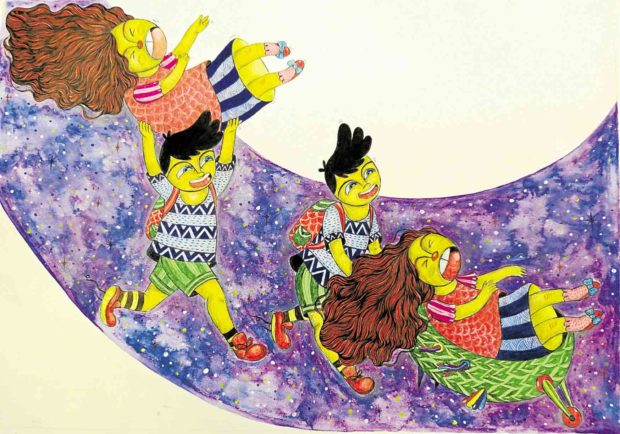
PLAYFUL Luis Chua’s playful illustration using acrylic paint, colored pencils, watercolor and ballpen for the children’s book, “Kiko Kitikiti,” is sure to attract kids’ attention. —EV ESPIRITU
BAGUIO CITY, Philippines — “Paalam Puti,” written and illustrated by architect-author Jomike Tejido, is about a 9-year-old girl who gives her dog a proper burial. It teaches a child to understand death and mourning the loss of a family member.
Another story, “A Little Crow,” by Chinese author, Xu Cui, is about an orphaned crow that has to learn how to live on its own. It imparts on kids lessons of independence and overcoming loneliness.
Both aim to introduce children to social issues and help them shape their sense of self, and will be part of an illustrated collection of stories tackling such issues as confronting children with special needs, suffering from a loss in the family and bullying.
With the working title “Kuwentong Musmos: Mga Bata ng Ating Panahon,” the book will be available in Filipino and Chinese, and will be translated to Indonesian, Lao, Khmer and other languages.
Room To Read (RTR), an international nongovernmental organization, has initiated the book project in partnership with publishing houses from the Philippines and China.
FINISHING TOUCHES Jomike Tejido puts the finishing touches on his illustration for the book, “Paalam Puti.” —VALERIE DAMIAN
During a workshop in Baguio City on Oct. 14 to 18, illustrators and representatives of the publishing houses said well-written storybooks should feature comprehensible words and characters that easily appeal to children.
“We want the readers to see themselves in the stories so they are able to empathize and identify themselves with the realities portrayed in the book and learn from them,” said Al Santos, book publishing manager for Southeast Asia RTR.
Parents can turn to the book for help when their children ask tough questions about certain subjects, Santos said.
28 stories
The anthology will feature 28 stories, with 20 titles from Philippine publishers Adarna House, Lampara Books, Anvil Publishing and Hiyas Books, and eight titles from Chinese publishing houses BabyType Publishing and Everafter Books.
It will also feature works from other children’s book illustrators like Felix Mago Miguel and Beth Parrocha.
Kuwentong Musmos will be donated to public schools as a part of RTR’s first initiative in the Philippines and China to develop literacy skills and promote a reading habit to beginning readers while advocating for children’s rights.
For now, RTR plans to print the book in the first quarter of 2020 and distribute an initial 10,000 copies for free in the Philippines and China.
Personal identities
Citing a study, Santos says children start to develop their personal identities during early childhood, and written literature helps them develop these.
Their parents, however, instinctively shelter them from the realities of society, he said.
WORKING TOGETHER Illustrator Claudine Aranza (top) with her artwork for the book, “Duyang Papuntang Bayan.” Aranza and a group of Filipino and Chinese book illustrators, editors and writers hold a workshop in Baguio City as they prepare to develop children’s books for Filipino and Chinese readers. —PHOTOS BY EV ESPIRITU AND VALERIE DAMIAN
Miguel said parents must “open up to their kids learning about [sensitive issues] because they are a huge part of how children develop.”
Books can be a vehicle for helping children understand the emotion of grief in the wake of their loss, Tejido said.
Sensitive issues
Other stories in the book talk about gender equality, public health care in rural areas and children with disabilities.
When developing children’s books, every detail is scrutinized more so when the subject is sensitive, Santos said.
The stories are also presented in a whimsical or colorful way to counterbalance their serious subject. For instance, human characters are presented as woodland creatures, buses are shaped like cats and islands like crabs.
Santos said there had been more initiatives from children’s book publishers to talk about social issues in recent years.
WORKSHOP GEMS Nina Martinez’s illustration for the book, “Si Noel at si Leon,” and Pepot Atienza’s mixed media artwork using clay and paper cutouts for the book, “Nanay kong Driver,” are among the gems produced in the Baguio workshop. —EV ESPIRITU
“Topics such as gender equality are now relevant issues of society. Now, the princess can save the knight and not just the other way around. Books now are more empowering for children than they were before,” he said.
Santos said he hoped to expand RTR’s initiatives in the country by publishing more books, building libraries and cooperating with government agencies.